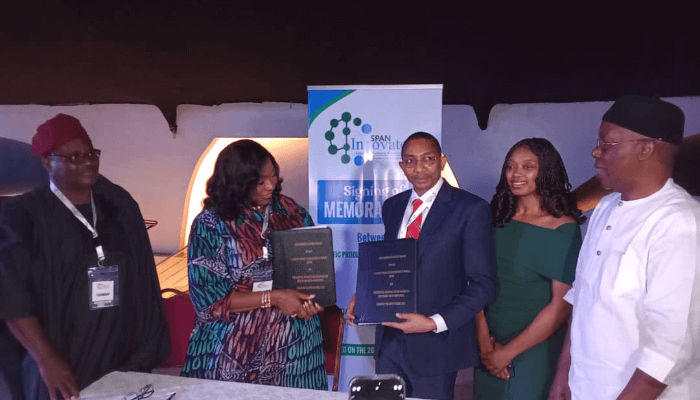50 Nigerian health firms advance funding discussions under PVAC’s $2bn facility
…As SPAN, PVAC sign MoU to boost local production of scientific, healthcare products
At least 50 Nigerian healthcare companies are in advanced funding discussions under a $2 billion long-term financing facility being mobilised by the Presidential Initiative for Unlocking the Healthcare Value Chain (PVAC) to accelerate local manufacturing and reduce dependence on medical imports.
Dr. Abdu Mukhtar, PVAC’s national coordinator, disclosed this during his keynote address at SPANINNOVATE 2025, a two-day conference and exhibition organised by the Scientific Products Association of Nigeria (SPAN), in Lagos, where both organisations signed a Memorandum of Understanding (MoU) to strengthen Nigeria’s healthcare and scientific manufacturing ecosystem.
Read also: States spend average of N3,483 per person on healthcare in 2024 BudgIT
Mukhtar said the PVAC initiative, launched by president Bola Ahmed Tinubu in October 2023, is designed to unlock investment opportunities and industrial capacity across the pharmaceutical, diagnostics, life sciences, and hospital sub-sectors, transforming Nigeria from a heavy importer into a self-sufficient producer of essential medical products.
“We have engaged Development Finance Institutions (DFIs) and secured commitments, notably $1 billion from one partner and €1 billion from another, to support feasible, bankable healthcare projects. These instruments include loans, equity, and guarantees, often at single-digit interest rates and with tenors of up to 20 years to 25 years, far preferable to current commercial bank rates,” Mukhtar said.
He noted that PVAC has developed a pipeline of 81 companies across pharmaceuticals, diagnostics, and hospital services, with about 50 of them now actively seeking funding and progressing through due diligence with partner financiers.
According to him, the financing effort is part of PVAC’s broader plan to increase local production of essential medicines to 70 per cent by 2030, reduce outbound medical tourism, and create thousands of new jobs within Nigeria’s healthcare value chain.
Mukhtar listed PVAC’s ongoing interventions to include fiscal incentives such as zero duty and zero VAT on imported raw materials and machinery for local production and capacity-building initiatives like the Manufacturing Academy (Empower Academy), designed to train technical personnel across Nigeria and the wider West African region.
He added that the Initiative has also established Medipool, a group purchasing organisation that aggregates demand and provides reliable market offtake for locally manufactured healthcare products. “We are building a fully integrated value chain, from policy to finance to infrastructure, that ensures the Nigerian healthcare industry is globally competitive. Our MoU with SPAN will strengthen collaboration in quality assurance, human capital development, and industrial linkages across the scientific products sector,” Mukhtar said.
Nigeria currently imports over 70 per cent of essential medicines, 99 per cent of medical devices, and nearly 100 per cent of vaccines, a situation Mukhtar described as untenable for a country of 230 million people.
With the $2 billion PVAC facility and its pipeline of 81 local firms, the country may finally be on course to reverse that trend, creating a new era of self-reliance in healthcare manufacturing and positioning Nigeria as a regional hub for medical and scientific products.
The high point of the SPANINNOVATE 2025 conference was the MoU signing between PVAC and SPAN, a move both parties described as a milestone for Nigeria’s healthcare industrialisation agenda under the Renewed Hope framework.
“This partnership with SPAN will not end on paper; it will translate into real action and measurable impact. We are committed to seeing results,” Mukhtar assured.
Dr. Kate Isa, SPAN president, who led the signing ceremony, said the agreement formalises collaboration between both organisations to deepen scientific research, promote local manufacturing of laboratory and medical products, and strengthen regulatory standards.
“This partnership underscores our shared belief that science and innovation must drive sustainable development. SPANINNOVATE is not just an exhibition, it is a platform where industry, academia, and government connect to transform ideas into tangible products that can compete globally,” Isa said.
Read also: Resident doctors warn of imminent collapse of healthcare system, urge Tinubu’s intervention
Founded in 1988, SPAN represents manufacturers, importers, and distributors of scientific and laboratory products in Nigeria. The association’s work spans strategic advocacy, capacity development, and quality standards enforcement across the country’s scientific products value chain.
Isa emphasised that Nigeria must move from consumption to creation by building local capacity in scientific manufacturing and reducing dependence on foreign inputs.
Representatives from TETFund, Standards Organisation of Nigeria (SON), Lagos State Environmental Protection Agency (LASEPA), and the Lagos State Government were also present at the event, pledging continued support for the country’s scientific and industrial development goals.
Mr. Opeyemi Eniola, Lagos state’s senior special adviser on Basic and Secondary Education, reaffirmed the government’s commitment to STEM education and innovation, noting that the state has invested N1 billion in research grants and deployed over 5,000 km of fibre-optic infrastructure, expanding to 6,000 km under a $22 million connectivity project.
Officials from SON and LASEPA also highlighted the importance of standards compliance, environmental monitoring, and laboratory modernization, as prerequisites for sustainable national development.

